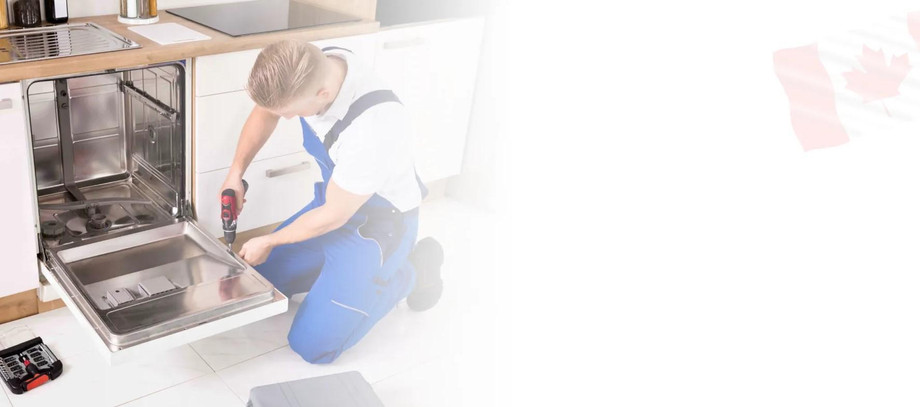Your dishwasher is a silent hero in the kitchen, working diligently to clean your dishes and cut down on your household chores. But what happens when this indispensable appliance starts showing signs of trouble? Dishwashing machine repair can save you time and money by extending the lifespan of your machine and preventing the inconvenience of washing dishes by hand. In this guide, we'll explore the common issues that dishwashers face, how to troubleshoot problems, and when to call in the professionals for expert dishwasher repair.
Common Dishwasher Issues:
Dishwashers are intricate appliances with many components, and various issues can arise. Here are some of the most common problems that homeowners face:
Poor Cleaning Performance: Your dishwasher may not be cleaning dishes properly, leaving behind spots, food particles, or residue on your dishes.
Water Leakage: If you notice water pooling around your dishwasher or see signs of water damage beneath it, you likely have a leak.
Draining Problems: A dishwasher that doesn't drain properly can leave standing water in the bottom of the tub or cause a messy backup.
Strange Noises: Unusual noises like grinding, rattling, or humming can indicate mechanical or motor issues.
Faulty Door Latch: A door that doesn't latch securely can lead to water leakage or prevent your dishwasher from running.
Detergent Dispenser Issues: If your dishwasher isn't dispensing detergent as it should, your dishes won't come out as clean as they should be.
Dishwasher Repair Essentials:
Before you consider calling a technician, you can attempt some troubleshooting and basic dishwasher repair yourself:
Check for Blockages: Inspect the filter, drain, and spray arms for clogs or debris. A blocked spray arm can result in poor cleaning performance, while a clogged filter or drain can lead to draining issues.
Clean the Dishwasher: Use dishwasher cleaner or vinegar to clean the interior of the dishwasher, including the spray arms and gaskets. Built-up residue can impair cleaning performance and lead to odors.
Inspect the Door Gasket: A damaged or worn door gasket can cause leaks. If you find issues, replacing it is a relatively simple repair.
Examine the Door Latch: Ensure that the door latch is properly aligned and securely latches when the door is closed.
Check the Float Switch: The float switch prevents the dishwasher from overfilling. Make sure it moves freely and isn't obstructed.
Examine the Inlet Valve: If your dishwasher isn't filling with water, the inlet valve may be faulty. Test the valve for continuity and replace if necessary.
Inspect the Heating Element: A malfunctioning heating element can lead to poor drying performance. Test it for continuity to determine if it's working correctly.
When to Call a Professional:
While many dishwasher issues can be resolved with DIY troubleshooting and repairs, there are situations where it's best to call in a professional dishwasher repair service:
Electrical Issues: If you suspect problems with the electrical components, such as the control panel or wiring, it's safer to leave it to a professional technician.
Motor and Pump Problems: If your dishwasher makes unusual noises or fails to drain properly, issues with the motor or pump may require expert attention.
Complex Mechanical Repairs: For complex mechanical components or parts replacements, it's advisable to have a professional handle the repair, ensuring that everything is installed correctly.
Warranty Considerations: If your dishwasher is still under warranty, attempting DIY repairs may void the warranty. Professional repairs will safeguard your warranty coverage.
Maintenance Tips for Preventing Future Issues:
Regular maintenance can help extend the life of your dishwasher and reduce the likelihood of repairs. Here are some simple maintenance tips to keep your dishwasher in tip-top shape:
Clean the Filters: Remove and clean the filters regularly to prevent clogs that can impair cleaning and draining.
Scrape Dishes Before Loading: Remove excess food debris from dishes before placing them in the dishwasher to prevent clogs and improve cleaning performance.
Use the Right Detergent: Ensure you're using the correct detergent for your dishwasher and the water hardness in your area.
Run Hot Water First: Run hot water in the sink before starting the dishwasher to ensure it fills with hot water from the beginning.
Regularly Clean the Interior: Periodically clean the interior, including the spray arms and gaskets, to prevent buildup of residue and odors.
Inspect and Replace Gaskets: Check the door gasket for damage and replace it if necessary to prevent leaks.
Practice Load Balancing: Avoid overloading the dishwasher and ensure that dishes are placed to allow for proper water flow.
For More Info:-
affordable washer and dryer repair
fridge repair home service near me
dish washing machine repair near me






Comments